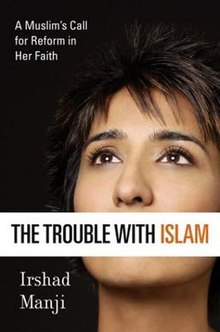Scholars have studied and debated Muslim attitudes towards Jews, as well as the treatment of Jews in Islamic thought and societies throughout the history of Islam. Parts of the Islamic literary sources give mention to certain Jewish groups present in the past or present, which has led to debates. Some of this overlaps with Islamic remarks on non-Muslim religious groups in general.

Islamic–Jewish relations comprise the human and diplomatic relations between Jewish people and Muslims in the Arabian Peninsula, Northern Africa, the Middle East, and their surrounding regions. Jewish–Islamic relations may also refer to the shared and disputed ideals between Judaism and Islam, which began roughly in the 7th century CE with the origin and spread of Islam in the Arabian peninsula. The two religions share similar values, guidelines, and principles. Islam also incorporates Jewish history as a part of its own. Muslims regard the Children of Israel as an important religious concept in Islam. Moses, the most important prophet of Judaism, is also considered a prophet and messenger in Islam. Moses is mentioned in the Quran more than any other individual, and his life is narrated and recounted more than that of any other prophet. There are approximately 43 references to the Israelites in the Quran, and many in the Hadith. Later rabbinic authorities and Jewish scholars such as Maimonides discussed the relationship between Islam and Jewish law. Maimonides himself, it has been argued, was influenced by Islamic legal thought.
A refusenik is someone who was denied permission to emigrate by the Soviet Union. It can also mean someone who refuses to comply with a rule etc.
The Middle East Media Research Institute (MEMRI), officially the Middle East Media and Research Institute, is an American non-profit press monitoring and analysis organization that was co-founded by Israeli ex-intelligence officer Yigal Carmon and Israeli-American political scientist Meyrav Wurmser in 1997. It publishes and distributes free copies of media reports that have been translated into English—primarily from Arabic and Persian, but also from Urdu, Turkish, Pashto, and Russian.
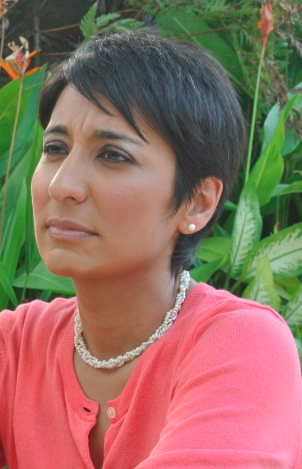
Irshad Manji is a Ugandan-born Canadian educator. She is the author of The Trouble with Islam Today (2004) and Allah, Liberty and Love (2011), both of which have been banned in several Muslim countries. She also produced a PBS documentary in the America at a Crossroads series, titled Faith Without Fear, which was nominated for an Emmy Award in 2008. A former journalist and television presenter, Manji is an advocate of a reformist interpretation of Islam and a critic of literalist interpretations of the Qur'an.
Gisèle Littman, better known by her pen name Bat Ye'or, is an Egyptian-born British-French author, who argues in her writings that Islam, anti-Americanism and antisemitism hold sway over European culture and politics.

Judeo-Arabic dialects are ethnolects formerly spoken by Jews throughout the Arab world. Under the ISO 639 international standard for language codes, Judeo-Arabic is classified as a macrolanguage under the code jrb, encompassing four languages: Judeo-Moroccan Arabic (aju), Judeo-Yemeni Arabic (jye), Judeo-Egyptian Arabic (yhd), and Judeo-Tripolitanian Arabic (yud).
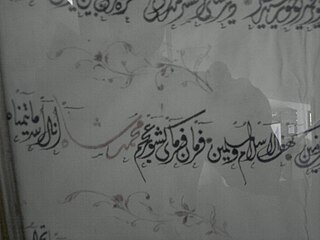
Ajam is an Arabic word meaning mute. It generally refers to non-Arabs, including those whose mother tongue is not Arabic. During the Arab conquest of Persia, the term became a racial pejorative. In many languages, including Hindi, Sindhi, Urdu, Persian, Turkish, Hindustani, Azerbaijani, Bengali, Kurdish, Gujarati, Chechen, Malay, Punjabi, Kashmiri and Swahili, 'Ajam and 'Ajamī refer to Iran and Iranians respectively.
Fi Zilal al-Qur'an is a highly influential commentary of the Qur'an, written during 1951-1965 by the Egyptian Sayyid Qutb (1906-1966), a leader within the Muslim Brotherhood. He wrote most of the original 30 volumes while in prison following an attempted assassination of Egyptian president Gamal Abdel Nasser in 1954. The book outlines Qutb's vision of a Muslim state and society. It has had much influence throughout the Muslim world, especially amongst the ordinary lay practitioners of Islam in the Arab world.

Judeo-Tat or Juhuri is a Judeo-Persian dialect of the Tat language historically spoken by the Mountain Jews, primarily in Azerbaijan, Dagestan, and today in Israel. It belongs to the southwestern group of the Iranian division of the Indo-European languages with heavy influence from the Hebrew language. In the era of Soviet historiography, the Mountain Jews were mistakenly considered to be related to the Muslim Tats of Azerbaijan. However, they do not share a common linguistic heritage, as the Mountain Jews kept their native language, while the Muslim Tats eventually adopted contemporary Persian. The words Juvuri and Juvuro translate as "Jewish" and "Jews".
Abdul HadiPalazzi, legally named Massimo Palazzi is the secretary general of the Italian Muslim Assembly, and the Khalifah for Europe of the Qadiri Sufi Order. Controversially in Muslim circles, as of April 2010, he not only supported Israel's right to exist but also encouraged Jews to re-settle in Hebron.

Tarek Fatah was a Pakistani-Canadian journalist and author. He was a Punjabi born into Islam and was a vocal critic of the Pakistani religious and political establishment, and the partition of India.
Islamic literature is literature written by Muslim people, influenced by an Islamic cultural perspective, or literature that portrays Islam. It can be written in any language and portray any country or region. It includes many literary forms including adabs, a non-fiction form of Islamic advice literature, and various fictional literary genres.
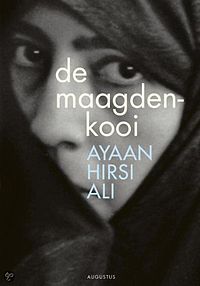
The Caged Virgin: A Muslim Woman's Cry for Reason, also published as The Caged Virgin: An Emancipation Proclamation for Women and Islam, is a 2004 book by the former Dutch parliamentarian Ayaan Hirsi Ali. The Caged Virgin was first published in English in 2006.

Raʾīs, plural ruʾasāʾ, is an Arabic title meaning 'chief' or 'leader'. It comes from the word for head, raʾs. The corresponding word for leadership or chieftaincy is riʾāsa. It is often translated as 'president' in Arabic, and as 'boss' in Persian. Swahili speakers may also use it for president. The Ottoman Turkish form of the title is reis, which denoted a captain .The term raʾīs is of pre-Islamic origin. It may function as an honorific laqab in a person's name. In the central Arab world, the term originally meant village headman.

Bahraini Jews constitute one of the world's smallest Jewish communities, although its origins go back to late antiquity. Talmudic sources refer to ports and islands on the Persian Gulf, indicating that Jews may have already settled in this region. Arabic sources record Jews in the old capital of Bahrain, Hajar, at the time of the Islamic conquest in 630 C.E. In the 12th century, the Jewish traveler-adventurer Benjamin of Tudela mentions 500 Jews living in Qays, and 5,000 in Al-Qatîf, involved in pearl fishery. In the 19th century, there were Jewish merchants from Iraq, Persia, and India in Bahrain.
Muslim supporters of Israel refers to both Muslims and cultural Muslims who support the right to self-determination of the Jewish people and the likewise existence of a Jewish homeland in the Southern Levant, traditionally known as the Land of Israel and corresponding to the modern polity known as the State of Israel. Muslim supporters of the Israeli state are widely considered to be a rare phenomenon in light of the ongoing Israeli–Palestinian conflict and the larger Arab–Israeli conflict. Within the Muslim world, the legitimacy of the State of Israel has been challenged since its inception, and support for Israel's right to exist is a minority orientation. Pro-Israel Muslims have faced opposition from both moderate Muslims and Islamists.
The Protocols of the Elders of Zion is a fabricated antisemitic text purporting to describe a Jewish plan to achieve global domination. The text was fabricated in the Russian Empire, and was first published in 1903. While there is continued popularity of The Protocols in nations from South America to Asia, since the defeat of Nazi Germany, Fascist Italy, and Imperial Japan in World War II, governments or political leaders in most parts of the world have generally avoided claims that The Protocols represent factual evidence of a real Jewish conspiracy. The exception to this is the Middle East, where a large number of Arab and Muslim regimes and leaders have endorsed them as authentic. Past endorsements of The Protocols from Presidents Gamal Abdel Nasser and Anwar Sadat of Egypt, Iraqi President Arif, King Faisal of Saudi Arabia, and Colonel Muammar al-Gaddafi of Libya, among other political and intellectual leaders of the Arab world, are echoed by 21st century endorsements from the Grand Mufti of Jerusalem, Sheikh Ekrima Sa'id Sabri, and Hamas, to the education ministry of Saudi Arabia.

Tahir Aslam Gora is a Pakistani Canadian broadcaster, editor, publisher, translator, and writer of fiction and non-fiction. He is a campaigner against the dangers of the Political Islam and the Muslim Brotherhood. He co-authored "The Danger of Political Islam to Canada: " exposing how the ideology of political Islam threatens countries and governments around the world, especially Canada and how the current policy of Canadian Prime Minister Justin Trudeau will jeopardize his country as a result of adapting and welcoming all Islamist and religious political currents. He was forced to flee Pakistan in 1999 following threats to his life and found asylum in Canada. As a member of Muslim Reform Movement and Founder & CEO of TAG TV, he holds progressive ideology and supports freedom of expression.
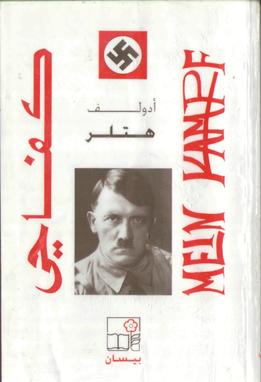
Mein Kampf, Adolf Hitler's 900-page autobiography outlining his political views, has been translated into Arabic a number of times since the early 1930s.
